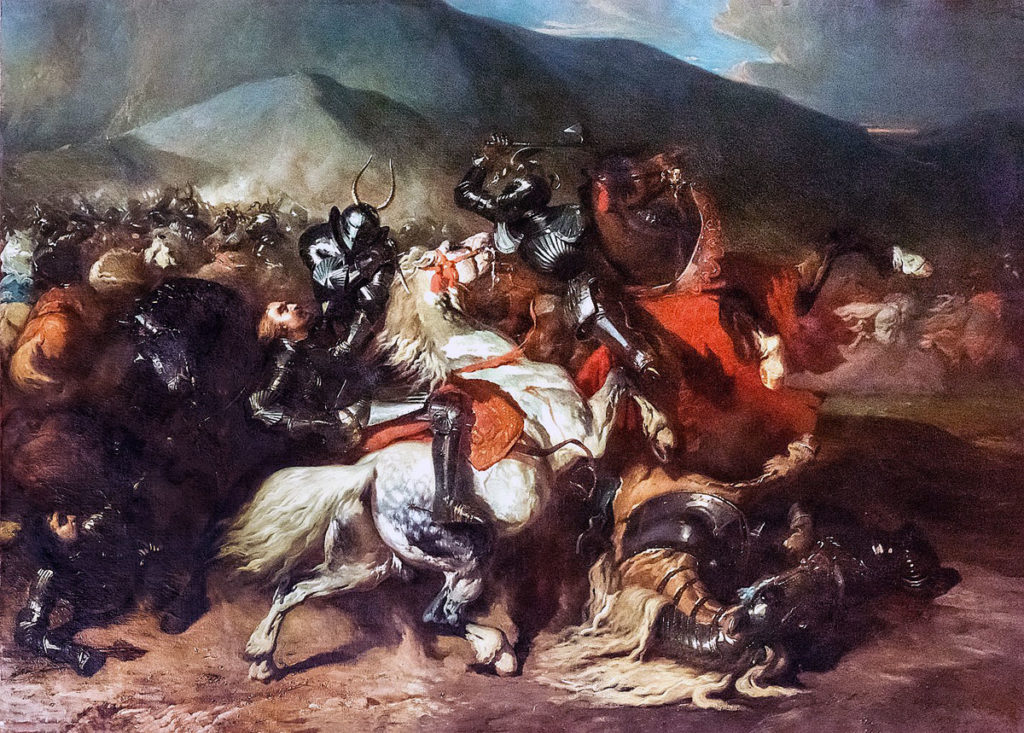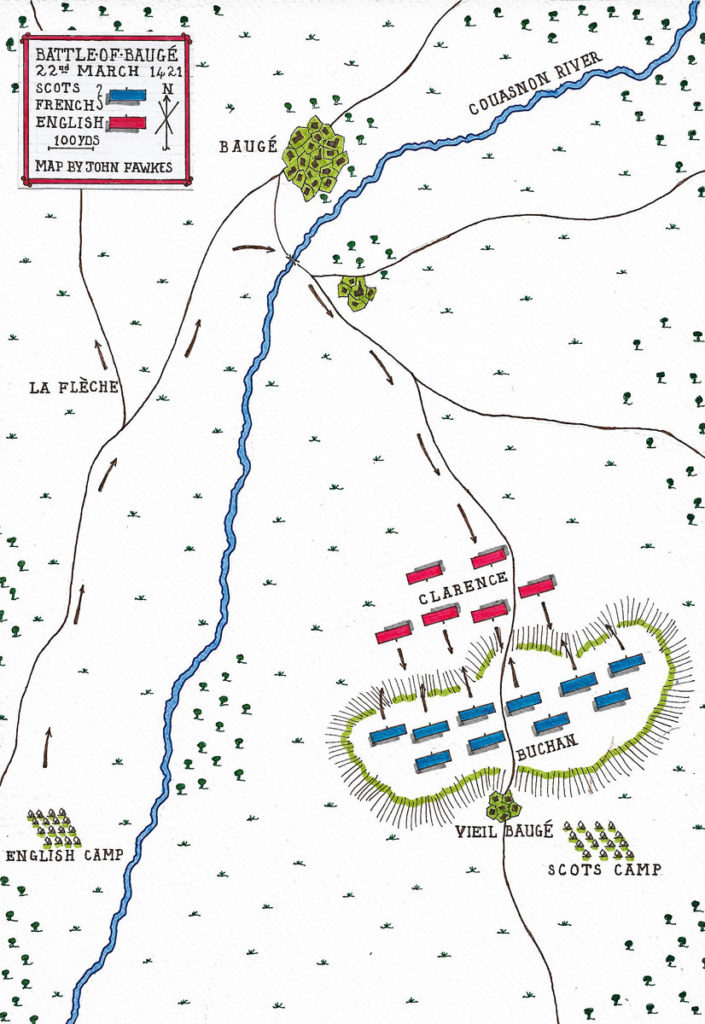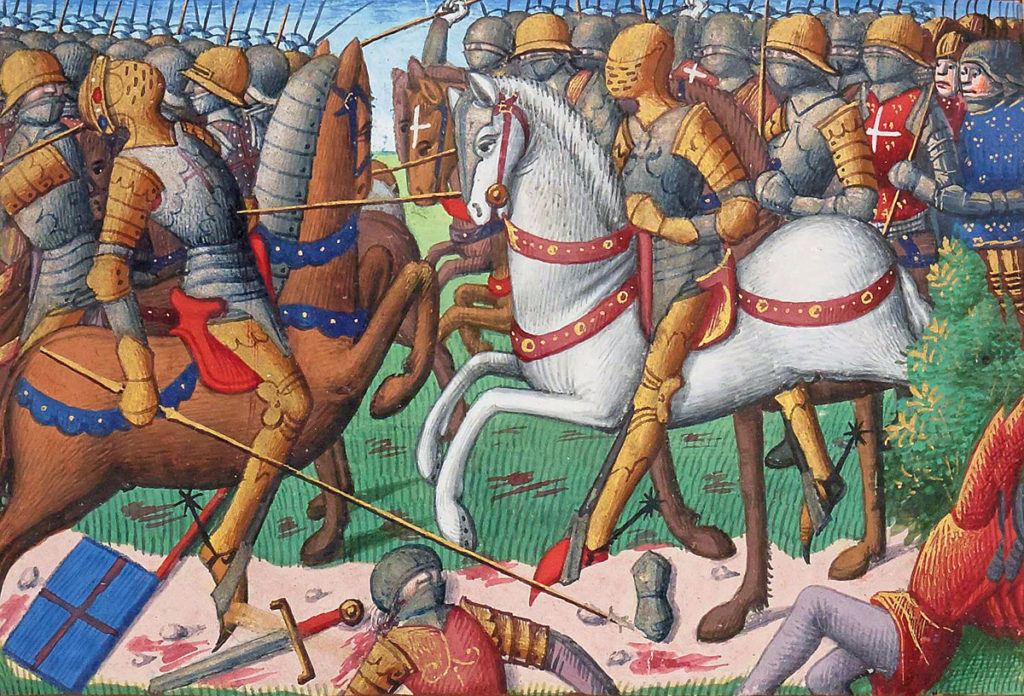The defeat of the Duke of Clarence and his English army by the Scots and French army of the Dauphin of France on 22nd March 1421 in the Hundred Years War

The previous battle of the Hundred Years War is the Battle of Agincourt
The next battle of the Hundred Years War is the Battle of Cravant
War: Hundred Years War.
Date of the Battle of Baugé: 22nd March 1421
Place of the Battle of Baugé: at Baugé to the north of Tours in central France.
Combatants at the Battle of Baugé: English against the Franco-Scottish army of the Dauphin of France.

Commanders at the Battle of Baugé: The Duke of Clarence, King Henry V’s younger brother commanded the English army. The Earl of Buchan commanded the Franco-Scottish army.
Size of the armies at the Battle of Baugé: The English army numbered around 4,000 men, of whom only around 2,500 men took part in the battle. The Franco-Scottish army comprised 5,000 to 6,000 men.
Uniforms, arms and equipment at the Battle of Baugé: Knights increasingly wore steel plate armour with visored helmets. Their weapons were lance, shield, sword, various forms of mace or club and dagger. Many carries two-handed swords in battle. Each knight wore his coat of arms on his surcoat and shield.
There were contingents of archers with both the English and Scottish contingents.
The archers carried a powerful bow, capable of many aimed shots a minute.
For hand-to-hand combat archers carried swords, daggers, hatchets and war hammers. They wore jackets and loose hose. Archers’ headgear was a skull cap either of boiled leather or wickerwork ribbed with a steel frame.
Winner of the Battle of Baugé: A decisive victory for the Franco-Scottish army of the Earl of Buchan.
Events leading to the Battle of Baugé:
Following the Battle of Agincourt in 1415 and the extended campaigns in France, King Henry V held a dominant position in the north of France.
With the Treaty of Troyes in 1420 between King Henry V of England and the French King Charles VI, the throne of France would on the death of the French king pass to Henry V and his heirs.
Continued resistance to the English and their Burgundian allies centred on the king’s son, the Dauphin, based in the western French city of Bourges.
Account of the Battle of Baugé:
In February 1421, King Henry V returned to England, after an absence in France of three years, leaving his younger brother Thomas of Lancaster, Duke of Clarence, in command of the English forces in France.
An impetuous soldier, the Duke of Clarence was thirsting for military success and acclamation, having missed the English victory at the Battle of Agincourt.
In March 1421, the Duke of Clarence embarked on a ‘chevauchée’ or extended mounted raid into Anjou in central France from Normandy.
The duke was accompanied by many of the senior English commanders, among them the Earl of Salisbury, the Earl of Huntingdon and Sir Gilbert D’Umfraville.
Clarence, with his force of 4,000 to 5,000 men at arms and a force of archers, around half the English strength in France, marched south, past Le Mans, crossing the Huisne and Loir Rivers, making for Angers.
At the beginning of 1421, a substantial Scottish force arrived in France to reinforce the Scots already serving with the Dauphin’s army.
Commanded by the Earls of Douglas and Mar, the Scottish troops were permitted by the Dauphin to act as a self-contained force.
Whereas French armies avoided battle against the English, the Scots did not consider themselves bound by this restraint.
Hearing of the arrival of the Duke of Clarence’s English force in the area of Angers, Buchan assembled his Scots army, which was cantoned in Touraine, and, with a small French force, commanded by Gilbert de Lafayette, crossed the River Loire at Tours and marched north-west towards the Loir River,
Clarence’s raiding force, finding Angers too well defended to attack without a siege train, turned east and made for the small town of Beaufort-en-vallée, heading towards Tours.
Buchan, at Le Lude on the Loir River, heard of Clarence’s move towards Tours and marched south-west to the town of Baugé, camping for the night of 21st March 1421 on the nearside of the river at the village of Vieil Baugé.
Neither army seems to have been aware of the precise whereabouts of the other.
On 22nd March 1421, a party of Scots soldiers was taken prisoner near the English camp.
The prisoners were brought before the Duke of Clarence and when questioned revealed that the Scots army was encamped on the far side of the river at Vieil Baugé.
Clarence resolved to march to Baugé and attack the Scots army without delay.
The Earl of Huntingdon and Sir Gilbert Umfraville remonstrated with Clarence, pointing out that most of the archers were away from the camp foraging, leaving the army without its most significant arm and that, in any case, the English were without intelligence as to the strength of the army it faced or the position it held.
Clarence brushed aside these objections saying that surprise was everything and that he intended to attack immediately and with whatever troops he had available.
Clarence’s force, amounting probably to only half his army or around 2,500 men and with few archers, set off towards Baugé, leaving the Earl of Salisbury to gather the foragers and follow the main army.
Baugé lies to the west of the Couasnon River, with a bridge over the river to its south leading to the village of Vieil Baugé.
Buchan’s Scots army was encamped at Vieil Baugé. A force of 100 Scots archers guarded the bridge over the Couasnon River.
At the time of the approach of Clarence’s force, the party of Scots archers was playing football.
Seeing the advancing English, the Scots archers ran for their weapons and took up positions to defend the bridge.
The English dismounted and forced their way across the bridge under a heavy fire from the archers.
As the English reached the east bank a party of French men at arms arrived, but were too late to prevent the crossing.
The Scots and French were forced to take refuge in a nearby church.
After attempting to storm the church tower, the Clarence’s force moved on towards the Scots camp at Vieil Baugé.
Warned of the English approach, the Earl of Buchan assembled the Scots army outside a cemetery on the outskirts of the village.
Both sides advanced on horseback before dismounting and attacking on foot, the English men-at-arms led by the Duke of Clarence, marked out by the bejewelled coronet he wore on his helmet.
The English had little chance of winning the battle, outnumbered, as they were, two to one by the Scots.
Clarence was one of the first English casualties, followed by Roos, Umfraville and Grey.
Demoralised at the loss of so many of their leaders, unsupported by the fire of their archers and forced back by the overwhelming number of Scots, the English men-at-arms broke and fled.
As with so many battles of the period, the seriously heavy losses were suffered by the losing side in flight, two-thirds of the English army being struck down.
As news of the disastrous battle became available, the Earl of Salisbury assembled the rest of the English force, mainly the archers returning from their foraging expedition and at dawn the next day marched hastily to the north.
Salisbury’s force crossed the Loir River at La Flèche, where the French had broken down the old stone bridge, the English archers building a make-shift bridge with timber from carts and neighbouring buildings, before marching on to Ponthieu, where the next obstacle in their path was the Huisne River.
A force of townsmen from Le Mans had dismantled the central section of the bridge across the Huisne River and guarded the broken crossing point.
A company of English archers, wearing tabards with the French white cross, persuaded the defenders to replace the bridge timbers, before crossing the river and killing them and many of the townspeople of Le Mans.
Out-marching the pursuing Scots force, Salisbury’s men reached Normandy and safety.
Casualties at the Battle of Baugé:
English and French heralds counted the dead left on the battlefield at Vieil Baugé.
The French had suffered few casualties.
The English dead on the field numbered 1,054 or 2/3 of the force that Clarence led into the battle.
A party of English archers came upon the battlefield the day after the battle. They retrieved the body of the Duke of Clarence and other prominent English officers.
Follow-up to the Battle of Baugé:
The Dauphin was overjoyed at the Scots defeat of Clarence’s army.
The Earl of Buchan urged the Dauphin that he should waste no time but invade Normandy before the English could recover.
The Dauphin failed to act on Buchan’s advice, enabling the English to recover from their devastating defeat.
However, the battle destroyed the reputation for invincibility enjoyed by the English and caused support for the Dauphin in France to increase significantly, in particular causing many nobles who supported or were considering supporting King Henry V and the Duke of Burgundy to re-consider their positions.
Anecdotes and traditions from the Battle of Baugé:
- The Duke of Clarence, as brother to the unmarried and therefore childless King Henry V of England, was the heir to the throne of England, increasing the impact of his defeat and death at the Battle of Baugé in France and in Britain.
- Following the Battle of Baugé, various senior Scots soldiers were appointed to the French nobility by the Dauphin. The Earl of Buchan was made Constable of France.
- The capture of many high-ranking English soldiers and noblemen at the Battle of Baugé brought considerable wealth to the Scots army by way of ransoms.
- A Scots highlander is said to have prised the jewelled coronet from the Duke of Clarence’s helmet after the Battle of Baugé and sold it to John Stewart of Darnley for the equivalent of £330. Darnley sold it on for £1,500.
- The captured Earl of Somerset was sold to the Dauphin for 40,000 ecus for him to ransom.
References for the Battle of Baugé:
Cursed Kings, Volume IV of the four-volume record of the Hundred Years War by Jonathan Sumption.
The Art of War in the Middle Ages Volume Two by Sir Charles Oman.
The Hundred Years War by Burne
British Battles by Grant.
The previous battle of the Hundred Years War is the Battle of Agincourt
The next battle in the British Battles series is the Battle of Cravant

